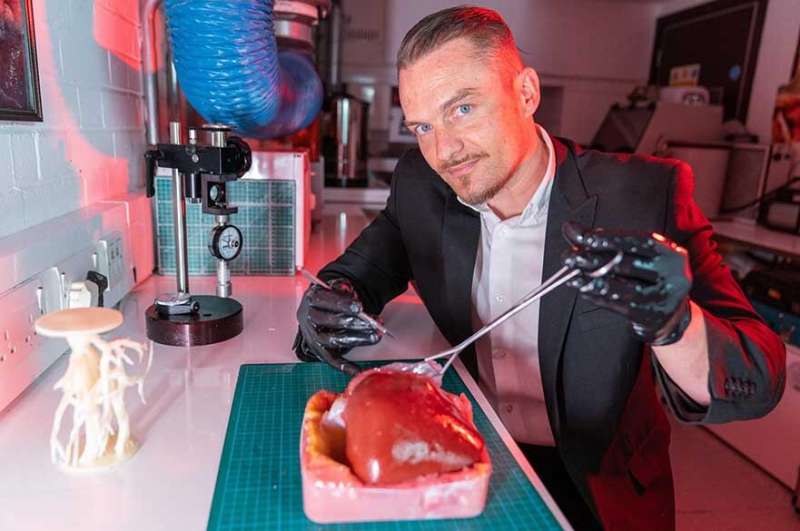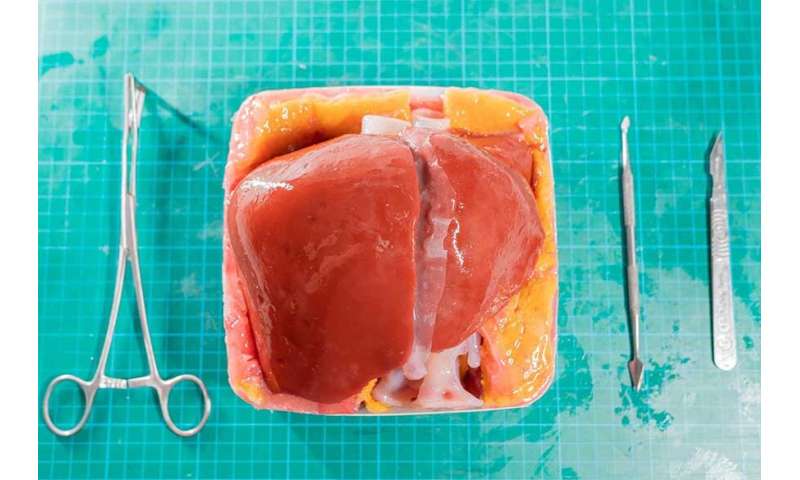3D-printed liver to help surgeons prepare for life-saving operations

Surgeons will perform liver resections with greater accuracy and deliver improved patient outcomes thanks to new research by Nottingham Trent University.
Senior Research Fellow Richard Arm has developed a way to 3D-print scan data of cancer-hit patient organs so that clinicians can rehearse difficult operations on lifelike models.
The aim is for them to become familiar with the hidden complexities of an operation—which are unique from patient to patient—prior to the real surgery.
A prototype 3D-printed model liver—based on an anonymised cancer patient—features the tactile qualities of a real diseased organ, including imitation blood and different tissue hardnesses, such as the blood vessels, liver tissue and the tumor itself.
The model—made from synthetic gels and fibers—even allows surgeons to use real surgical tools to practice endoscopies and laser ablation techniques, during which arteries are resealed by laser to prevent a patient bleeding out during surgery.
“Surgeons have an incredibly complicated job to remove some tumors to save people’s lives,” said Mr Arm, a Ph.D. candidate in the School of Art & Design, and member of the Advanced Textiles Research Group (ATRG).

“But due to the limitations of existing technologies available to them, many surgeons only discover the true complexities of an operation when they are in the midst of the live procedure itself.
“Every patient is unique and has organs of different shapes, sizes and constructs, so there can be many hidden complications that they have to deal with.
“But this research shows how existing scan data and modern 3D-print processing methods can dramatically improve the preparation available before the first incision is even made.
“It could give surgeons increased confidence and may provide patients with improved outcomes, such as the increased retention of healthy tissue, reduced risk of infections and swifter recovery times.”
Cancerous Liver Model captions
The research also considers the potential for teaching trainee cancer surgeons in traditional and robotic tumor removal, and could improve robotic surgical interfaces and operator proficiency. It may also allow surgeons to become more familiar with using robots to perform surgery remotely.
Dr. Clarke said: “This technology could give surgeons increased confidence in each procedure they undertake, by allowing them to better understand an individual patient’s anatomy and potentially reduce the risks to patients during what can be incredibly difficult, life-saving surgery.”
Citation:
3D-printed liver to help surgeons prepare for life-saving operations (2021, June 18)
retrieved 18 June 2021
from https://medicalxpress.com/news/2021-06-3d-printed-liver-surgeons-life-saving.html
This document is subject to copyright. Apart from any fair dealing for the purpose of private study or research, no
part may be reproduced without the written permission. The content is provided for information purposes only.

